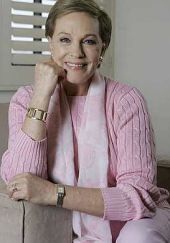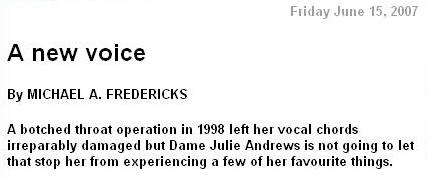 |
|
Dame Julie Andrews was the voice for Queen Lillian in
Shrek the Third.
|


 |
|
Dame Julie Andrews was the voice for Queen Lillian in
Shrek the Third.
|


She is 71 going on 72, but Dame Julie Andrews would put women (or, for that matter, men) half her age to shame. And it’s not limited to her physical appearance (taut skin, toned body, perfect posture) either; the lady exudes class and grace from every pore. Add to that an incredibly humble and down-to-earth nature that belies her status as an all-time screen legend, and you get the kind of movie star that just does not exist anymore.
It’s all rather appropriate then that in her recent movies, including Shrek the Third – for which she is being interviewed by the group of eight entertainment scribes gathered in Los Angeles – she has been cast as royalty.
But why does she think she’s been given these roles?
“Perhaps it’s because I played the queen once, and they probably thought,
‘That’s a good idea, we’ll ask her again.’
“Actually, I don’t know why they ask me. I think it’s something to do with my English accent. Somebody in the other room singled out me, Helen Mirren, Judie Dench and Cate Blanchett, and I said, ‘There you are. We’re all English!’” she answers with the very same English accent, enunciating every word distinctly.
When reminded that Blanchett is Australian, Andrews quickly retorts: “Oh well, close enough. Excuse me. But certainly, let’s say, Commonwealth.”
Queen Lillian is Andrews’ third role as royalty, one that represents a voice of reason in the fairytale kingdom of Far Far Away, and it is a character that’s very much like her – strong, proactive, calm and collected – albeit slightly on the unconventional side.
“I think she’s a little bit like me. I think she’s strong and sensible and I hope I’m all those things.
“Also, I think it’s wonderful that Queen Lillian has a frog for a husband, and an ogre for a daughter. She’s terribly practical about the whole thing! In fact, she tickles me, I love the character. And she’s got a very strong head.”
Blessed with a four-octave singing voice and perfect pitch, Andrews was, as a child, introduced by her mother and stepfather, to the world of entertainment, regularly performing to packed music halls. This continued into adulthood, with Andrews becoming a bona fide Broadway star when she wowed audiences as Eliza Doolittle in the stage musical, My Fair Lady.
And then came the TV roles, which paved the way for her entry into movies. She made her film debut in Mary Poppins (1964), and then later captured the hearts of a whole generation, with her portrayal of the governess Maria in the massive hit The Sound of Music (1965).
She continued to push herself in even more challenging roles – baring her breasts in S.O.B (1981), then following it with Victor/Victoria (1982) where she played a woman playing a man playing a woman – but it is her first two musicals that most fans will remember.
Children today, however, “don’t know Mary Poppins or Sound of Music; they know Princess Diaries better,” she says, without a hint of disappointment in her voice.
Of course, the fans that remember her as a vocalist would know how much was lost to the unfortunate surgery that left her vocal chords irreparably damaged.
Andrews speaks openly about the loss of her voice, and says that she’d never stop mourning the fact that she won’t be able to sing again.
One won’t begrudge her for being just a tad bitter about it, but she doesn’t allow such a negative emotion to take hold.
“It’s a little late to be bitter about it – it happened. I denied it for a very long time because I hoped that over time my singing voice might return, but it’s not going to, I don’t think, so now I can talk about it much more easily.”
Not one to rest on her laurels, Andrews is keeping herself busy with projects aplenty.
She is currently working with a vocal restoration group, but says that it isn’t to find a cure for her but instead for “people out there who really do need to be helped, who can be helped.”
She has a special interest too, being in a movie like Shrek the Third that references fairytales, as she has turned to writing children’s books in recent years.
Her books, collectively known as the Julie Andrews Collection, are published under a small publishing company that she and one her daughters run. And as if all this isn’t enough to keep her busy, Andrews is, at present, writing her autobiography.
“I’m not writing my entire life. I could not write all of that, but I am writing about half, probably the beginning of my life, the period that many people don’t know about. So I’ll bring it up to about Mary Poppins and that’s where the book ends.”
As Andrews talks about her books – especially her children’s books – it becomes increasingly obvious that this has become as dear to her as her singing was; it is probably one of her favourite things.
She recalls a conversation she had with her daughter, Emma Walton Hamilton: “What my lovely daughter said to me one day, when the subject of the loss of my voice came up – she asked me, ‘Mum, are you hurt?’
“And then she said, ‘But you’ve just found a different way of using your voice, which is with the children’s books’. And I went, ‘I never thought of it that way.’ But it’s true! It’s true!”